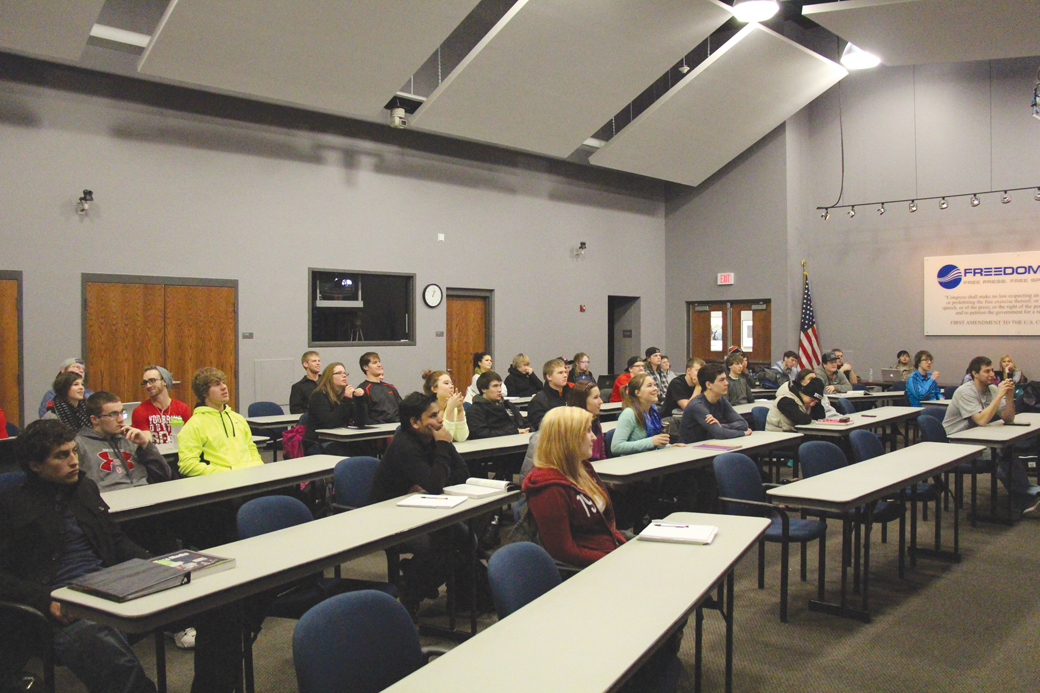
Lawsuit prompts academic misconduct procedure change
A new policy is changing the way University of South Dakota faculty must handle cases of academic misconduct.
Staff at the South Dakota Board of Regents made clarifications on academic misconduct procedures, which are now being implemented at all six regental institutions.
Kurt Hackemer, associate vice president for Academic Affairs, said the policy clarifications had been talked about at the system level since summer 2013. The changes are still in compliance with an SDBOR policy that outlines academic misconduct and how to handle such cases.
“We wanted to make sure what we did at USD makes sense with what the Board wants,” Hackemer said. “I’m hopeful that we’ve reached a point of stability.”
Jim Shekleton, who serves as the SDBOR general counsel, said the need for clarification about academic misconduct procedures comes partly from litigation that involved a USD graduate student and the university.
The policy
The changes, which went into effect at the beginning of spring semester, now require a two-step process in which any student and faculty member dealing with academic misconduct must follow.
Shekleton worked with provosts and deans of students from each institution to clarify the procedures.
buy azithromycin online https://www.parkviewortho.com/wp-content/languages/new/prescription/azithromycin.html no prescription
“What we’ve done with this new practice is to give students the chance to have facts reviewed,” Shekleton said.
Once accused of academic misconduct, the first change outlines that an informal discussion between the accused student and the faculty member who suspected the instance of misconduct must take place.
After a discussion between the instructor and student regarding the allegation of misconduct has occurred, a form documenting the discussion must also be filled out. If the student admits to the allegation, their signature is required.
The form is sent to the Office of Student Rights and Responsibilities, which is overseen by Dean of Students Kim Grieve.
“Hopefully a student and instructor can come to the right decision on their own,” Grieve said.
If both the student and instructor agree academic misconduct occurred, academic consequences can be imposed at the discretion of the instructor. Students have the option of appealing the consequence(s) under SDBOR policy 2:9, which goes over student appeals.
Junior Jesse Pechous said students caught cheating should have to put more work into the class.
“They should be given a zero and should have to do the assignment and extra work should be required to know the work,” Pechous said.
The second change allows for the accused student to appeal the allegation made against them if the faculty-student discussion does not lead to an admission.
“Just to make sure that the student has due process, there needed to be another level,” Grieve said. “This change does that.”
The case is then reviewed by the Office of Rights and Responsibilities, and if the formal disposition hearing process concludes academic misconduct has occurred, a panel of faculty will hear the case and make a final judgment.
The panel consists of eight faculty, who were nominated by the deans of every college at USD. The list of faculty serving on the panel was unavailable at the time of publication. The panel consists of: Michael Hook, David Burrow, Jean Caraway, David Swanson, Mark Sweeney, Mandy Williams, Robin Wiebers, David Hulac, Frank Zavadil, Mike Allgrunn.
“The faculty understand better than anyone else the nuances of what happens in a classroom,” Hackemer said.
An email from the Office of Academic Affairs was sent to all USD faculty Jan. 6, informing them of the upcoming changes, and was a topic of debate at the university Faculty Senate meeting Jan. 15, because the burden of proof falls solely on the instructor and student involved.
“It is a little less convenient, but what our process does now is forces a student to defend whether or not they committed academic misconduct and appeal the consequence,” Hackemer said. “It adds time to the process, which can be a problem — especially towards the end of the semester — but I see the necessity for doing it.”
The academic misconduct policy change has also provoked conversation about wording in the Faculty Handbook, focusing mainly on who has disciplinary discretion.
“It boils down to the responsibilities of faculty,” Sam Gingerich, SDBOR system vice president for academic affairs, said.
Follow reporter Trent Opstedahl on Twitter @TrentOp

